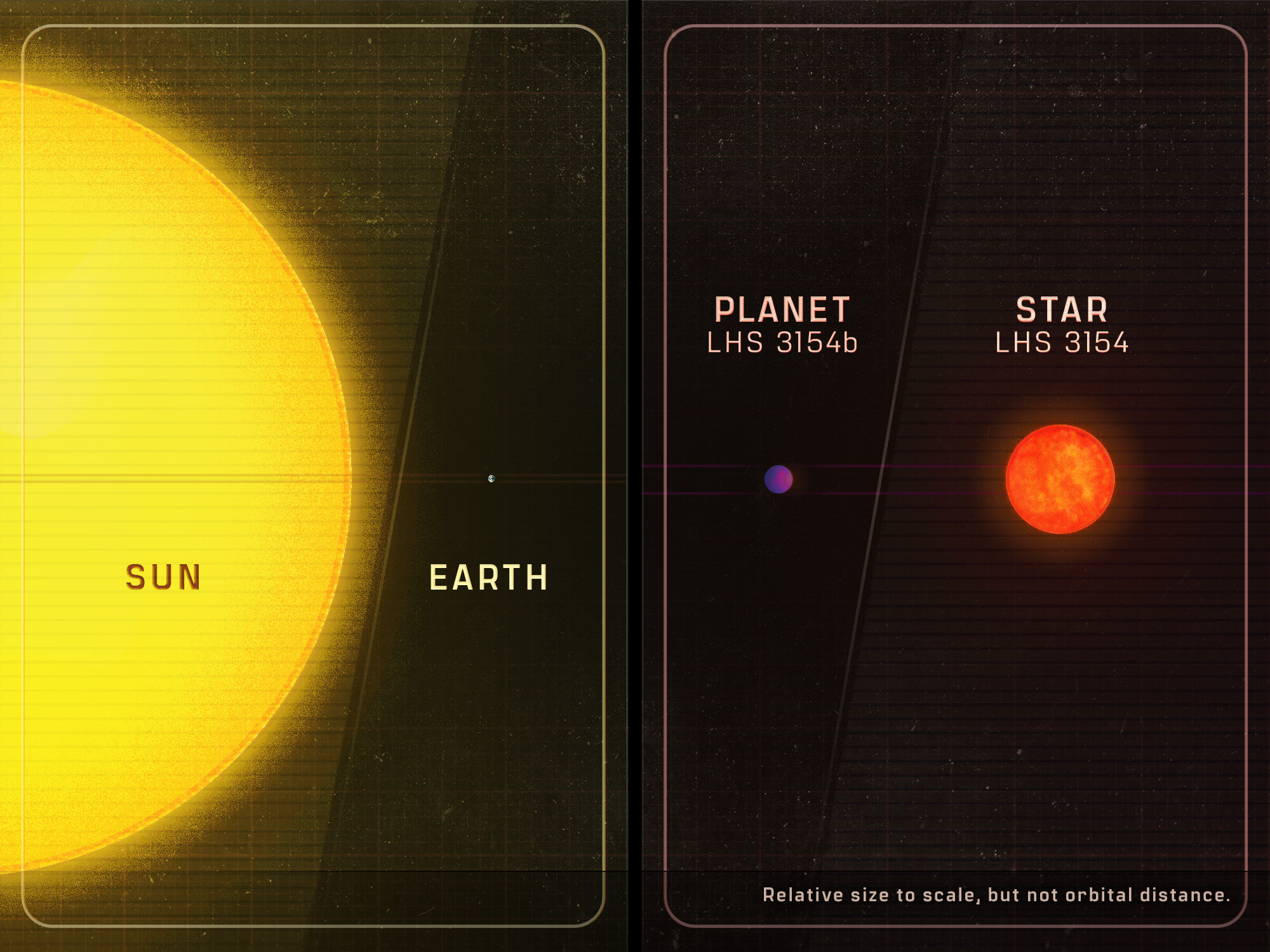The discovery of a planet that is far too massive for its sun is calling into question what was previously understood about the formation of planets and their solar systems, according to Penn State researchers.
In a paper published in the journal Science, researchers report the discovery of a planet more than 13 times as massive as Earth orbiting the “ultracool” star LHS 3154, which itself is nine times less massive than the sun. The mass ratio of the newly found planet with its host star is more than 100 times higher than that of Earth and the sun.
The finding reveals the most massive known planet in a close orbit around an ultracool dwarf star, the least massive and coldest stars in the universe. The discovery goes against what current theories would predict for planet formation around small stars and marks the first time a planet with such high mass has been spotted orbiting such a low-mass star.
Couldn’t this just be planetary capture? A low mass sun just happened by a slow moving planet that had been ejected from it previous orbit, and both of them were just like, “wanna hang out?” and that’s that? I know the odds are astronomical (pun), but it is the universe we are talking about… things do happen.
Most likely. Couple this with the recent report that there are way more rogue planets than previously thought.
Which is kinda terrifying when you think about it
I don’t know why people keep referring to space stuff as terrifying or spooky.
It’s fascinating!
Two possibilities exist: either we are alone in the Universe or we are not. Both are equally terrifying.
-Clarke.
If he can say it, I support the term.
I think he’s wrong too. I mean, sure, he can be terrified by whatever he wants. But I just don’t see the reasoning behind it.
An empty universe means it’s all ours. No competition, no threats, our descendants can expand at whatever the ultimate maximum speed can be practically achieved. We got there first and so we claim the prize.
There is essentially no way we are the only ones in the entire universe. It would have to be the most astounding and amazing luck for that to be the case…. Vanishingly small, might as well be zero, chance of being the only ones. The universe is an absolute monster in size. There is no way for our monkey brains to even fathom how big it is. We need abstract numbers to even talk about it, which make it so anything that could exist most likely does.
However, those extraterrestrial peers of ours may be so far away that we might as well be alone. Even if we traveled for millions of years and kept our warring civilization from destroying itself, we may only explore a small percentage of this one single galaxy. Even if we managed to catalogued the entire thing, there are still 200 billion more galaxies out there. Our alien buddies may be on one of those that will soon blip out of existence due to universal expansion before we could get there, even if we traveled at maximum speed, never to be seen or heard from again.
When we talk about actually attainable and achievable exploration goals, the chances of other intelligent life existing get sort of really small. That is what I find to be not terrifying, but somewhat depressing to think about.
We are indeed limited in what portion of the observable universe is reachable thanks to the expansion of the universe. IIRC something like 95% of the galaxies we can see would be impossible to ever reach even if we travelled at the speed of light to get there, they’d disappear across the cosmological event horizon before we could get there.
But 5% of the observable universe is still pretty darned big. I wouldn’t be surprised if our expanding sphere of colonization eventually bumped into another one. But we’ll have colonized hundreds of millions of galaxies by then, so I’m not going to be too upset by that. Mustn’t get greedy. :)
You might be interested in this article, Eternity in six hours. It suggests that a civilization with access to six hours’ worth of a single Dyson swarm’s total energy output could launch a colony ship to every galaxy within that reachable horizon. This makes the Fermi paradox a lot sharper since aliens could do the same thing, but it really illustrates just how easy it should be to get spreading around the cosmos once we get up into space in a serious way.
If we expand into the galaxy, even into just our local bit of galaxy, we will make a new threat out of some of the colonies.
We will also be those colonies, though. So whoever wins it’s us.
Humanity has always had internal conflict. That’s just part of us being us. Though perhaps our descendants will develop in less contentious ways, if that works well for them.
Eh just the rare but non zero chance a Venus sized 8 ball is rolling our way, zero chance of us doing anything about it.
It just bucks the desire for an ordered, permanent universe, which is comforting to humans
a Venus sized 8 ball is rolling our way
How much warning would we have? Weeks? Years? Centuries? If we had a decent warning, we might prioritize establishing lunar and martian colonies if, you know, the fate of all known life depended on it.
I feel like humanity would be more likely to fast track world war 3/4/whatever we’re on by then, nuclear winter, and near (if not complete) human extinction. But I also have little faith in humanity, so there’s that. 🤷♀️
Ok, but this is a space community. Back to the question. How much would we have?
In the mind-bogglingly unlikely event that a Venus-sized object was on a collision course with Earth, I’d guess we’d likely have a couple of years’ warning. Maybe a decade. It’s not easy to detect objects out beyond Neptune, even when they’re sizeable.
The odds are so incredibly small that they’re not worth worrying about even abstractly, IMO. The Solar System has gone for 4.5 billion years without any of the Terrestrial planets in it being smacked by a rogue planet (I suppose it’s possible one of the gas giants might have swallowed a small one in the distant past, though even then I’d expect signs of such an event to remain on its moons) so the chance that one might happen to come along right at this instant in time is vanishingly small.
I find the sheer enormity of the scale of both time and space terrifying
But why? How is it a threat to you?
I find it mind boggling, and inspires me to live my life by paying attention to what matters only.
I don’t really have a good answer for this and frankly it’s probably not rational or coherent or succinct so I’ll just say it comes down to mortality, knowing how small and insignificant we are and desperately clinging to a meaningless life on a meaningless planet in a meaningless etc. etc. etc.
There’s so much out there that we don’t know and probably never will and it’s all growing faster than we could ever hope to catch up with and we’ll all be dead so soon relative to the lifespan of the universe and it’ll just keep going on long after our meat sacks stop functioning and turn into nothingness until maybe everything turns into nothingness and then there’s never anything ever again or maybe that won’t happen but we’ll all still be long, long gone.
Well, when you put it like that, yup. I can relate.
I’ve been trying to come to terms with it by thinking (or trying to convince myself) that this curiosity and willingness to observe everything and learn all things are just evolutionary adaptations whose sole purpose is to survive. Like, our curiosity to explore pushed us to get to better places with better living conditions. But that survival function is now too overfitted, like cancer cells that just replicate and replicate and replicate… strange analogy, I know. So there’s nothing inherently of value in having such attributes. “Why are we here? Where are we going?” So deep! Hm, nope. We’re just machines programmed to survive by just searching, searching, searching, and finding, and understanding, and harnessing, and… searching and searching and searching.
Anyway. Then I stop thinking about that and go make myself a sandwich.
Especially for someone (me) who just watched Melancholia - gulp!
Why?
That’s exactly what I was thinking. Almost like they are dependent on each other for orbit.
the neutron star is small enough to sneak into a solar system and get away with a planet as a hostage… it’s the ninja star…
Beyond that, Jupiter is 100,000 times the mass of the Earth. Should Jupiter not exist? This star is a red dwarf, or maybe the smallest possible main line type G2V star that we’ve seen, it could also be an M class star. This planet is in the same general area of the gravitational field of said star, that the asteroid belt and Jupiter would occupy in our star’s much larger gravitational field. It seems probable that giant rocky planets would form, but be so far outside the “Goldilocks zone” of the star as to be permanently frozen.
Edit: I’m not an astronomer, so I probably missed something.
It just sounds like the headline should read something like: “This planet couldn’t exist around Sol, so why does it exist?” or “We found a planet that can’t exist in our solar system, here’s why the star it exists around probably allowed its formation.”
Edit 2: The average density of “empty space” inside galaxies is 28.9 solar masses of dust per cubic light year. There’s more than enough dust out there for any star to form its own inner planetary, asteroid, and comet, systems. As well as several outer planets.
The close orbit makes that less likely, due to the way orbits work. Even if the planet was moving very slowly when it encountered the star, it accelerates as it gets closer and would end up with an elliptical orbit with a farthest point at about the same distance away as when the star first became a dominant force on it. If it were our system, the planet would spend most of its time in the Ort Cloud and occasionally it might venture into the area the gas giants live in or maybe even the inner solar system. It wouldn’t necessarily be on the same plane as the other planets, too.
In order to find a close orbit and stay in it, it would have to kick other planets out, giving its momentum away when it was close (which makes it rarer than just a capture, especially considering it might not even be on the same plane as other planets in orbit). Or some other event would need to perturb the orbit just right.
But unlikely doesn’t mean impossible.
Don’t fat shame that poor planet, it’s just doing its thing!
Also don’t small shame the star, it’s trying it’s best!
These poor celestial bodies don’t deserve this type of disrespect.
It was probably a wandering planet that was captured by the dwarf star.
Neat!












